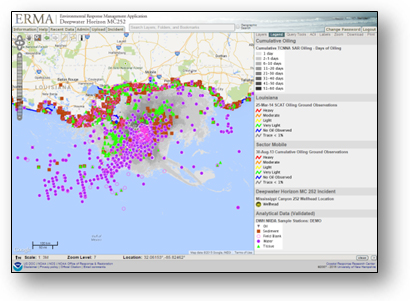OR&R Coordinates with Industry Regarding Effective Situational Awareness for Oil Spill Response
OCT. 27, 2017 — IPIECA, the global oil and gas industry association for environmental and social issues and the American Petroleum Industry (API) have initiated a joint project to determine how situational awareness and the Common Operating Picture can be better utilized to inform key response decisions and the development of response strategies.

A half-day exploratory workshop was held on October 24 at API's offices in D.C., which sought input from input from regulators, state and federal trustees, OSROs, and industry representatives. Those participating from OR&R and attending on behalf of NOAA included Director Dave Westerholm; Scott Lundgren, Emergency Response Division Chief; and Michele Jacobi, Data Coordinator.
IPECA provided background materials regarding their Recommended Practices for COPs and insights from the USCG’s Deepwater Horizon Oil Spill Incident Specific Preparedness Review to help focus the workshop. The group discussed the types of data that are critical for informing response decisions, the strengths and improvement opportunities for the data management process, and priority areas of interest for further development. Based on these robust discussions IPECA and API will continue to work this topic together and follow up discussions and / or working groups may be formed. OR&R will continue to engage with industry regarding this effort to support effective situational awareness during incidents and to help improve our Environmental Response Management Application (ERMA®) Common Operating Picture.
The image shows an example of NOAA's Common Operating Picture, ERMA, during the Deepwater Horizon Oil Spill. This image depicts hundreds of environmental samples overlaid with the remote sensing oil footprint and shoreline clean up observations from field teams. Effective Common Operating Pictures can be created with the support of Data Sharing Plans, which are agreed to by all response parties and ensure access to the available incident data. Data filtering and customized data set views can help to prevent information overload during a response.
For more information please contact Scott.Lundgen@noaa.gov or Michele.Jacobi@noaa.gov.
